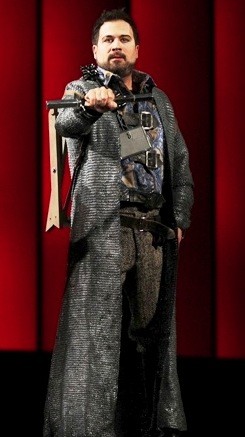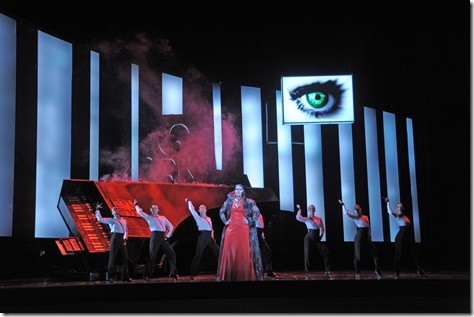Handel's Rinaldo Wins at the Lyric Opera
Daniels, Davies, Pisaroni, Prina, Kleiter, Van Den Heever, First Among Equals
By: Susan Hall - Mar 05, 2012
Rinaldo
By Georg Frederic Handel
Conducted by Harry Bicket
Directed by Francisco Negrin
Sets and costumes by Louis Desire
Lighting by Bruno Poet
Cast: Sonia Prina (Goffredo), David Daniels (Rinaldo), Julia Kleiter (Almirena), Iestyn Davies (Eustazio), Luca Pisaroni (Argante), Elza Van Den Heever (Armida).
The Lyric Opera of Chicago
Lyric Opera House
Chicago, Illinois
March 4, 2012
Three hundred years ago to the year, Georg Frederic Handel arrived in England, fresh from studies of Italian opera in Italy, where he met with both Scarlattis, Corelli and Steffani. In England, the Queen’s Theater soon to be known as the King’s was preparing for his arrival and his first Italian opera which would be composed for the House.
Manager Aaron Hill personally scripted the synopsis, based on a perennial best seller, Jerusalem Delivered by Tasso. He employed Giacomo Rossi, an Italian poet and language teacher to write a libretto.
GM Hill had brought together the finest singing talent from Italy for the season. Handel composed music to the words, and produced one of his inimitable dynamos, Rinaldo.
Handel had hoped to capture the characteristics of Italian music: fluency in the treatment of verse, accurate declamation, flexible harmonic rhythm in recitative, a distinction drawn between vocal and instrumental material. Of course when you hire Handel, you hire his wonderful melodic gift.
Cut to the Lyric Opera of Chicago today, where many of the world’s great singers have been gathered to perform a glistening new production of the opera, whose story and characters seem as contemporary as the universal emotions they express. Plot points that might obscure the beauty of the music are camped up to make them fresh. For the original production, GM Hill had been determined to use the theater’s machinery to combine the virtuosity of Italian singing with the extravagance of 17th century masque. The Lyric staging succeeds beyond Hill’s and Handel’s wildest dreams.
Louis Desire, like Willy Decker, knows that a minimalist, but provocative set, sets off the music and the singing and helps to bring out glorious Handel. Not that eye candy is missing. In fact, it abounds here. Panels whose lighting reflects the emotional thrust of a scene provide a backdrop. Jerusalem in block letters like a magnified Robert Indiana sculpture stands tall for the wall, which is climbed by Rinaldo and dominated by Argante, King of Jerusalem, until Rinaldo recovers from the spell cast on him by Armida, sorceress in the service of the Saracens, but really tending to her personal love interests.
Luca Pisaroni makes his Lyric debut as Argante (many of the rest of the cast are making both US and Lyric debuts). He is a dynamic bass baritone and reports that there is nothing he would rather do than burst on to a scene, singing full throttle, which he does with fury and passion and then continues to his demise of mixed blessings.
Without become too entangled in the plot, which would take pages to précis, Francisco Negrin, the director, has obviously made each and every one of the performers comfortable and so the singing is fabulous. As Rinaldo, David Daniels, whose voice is always beautiful and dramatically apt, moves and acts at the top of his game. Iestyn Davies, as the religious fanatic who is Rinaldo’s cohort, is a great countertenor, whose texture is pure and yet piercing. Davies performs with that step by step attention to detail which, in combination with the sheer beauty of his voice, makes him stand out wherever he appears.
In the trouser role of Goffredo, father of Rinaldo’s love interest, Sonia Prina was captivating after she warmed up. His/her daughter Julia Kleiter, who sang often tangled in the strings of a harpsichord in which she is held captive, had a lovely, robust soprano. Her delivery of the opera’s most famous aria, Let Me Weep, brought down the house.
Who could miss Elza Van Den Heever at the Frankfurt Opera house, and throughout Europe where she performs regularly. The Lyric cast her as Armida, the type of meaty role on which she thrives. She notes that in an aria like “Ah Cruel,’ where she is challenged to sing long, slow phrases cheek to jowl with the fast and florid, provides her kind of challenge. Van Den Heever is a first class actress. Dressed like Morticia, but in glistening red patent that catches light as she streaks across the stage, hands crooked akimbo, love cuts through her camp to move us.
During his lifetime, Rinaldo was Handel’s most performed opera, but it languished for two hundred years after his death. Slowly it has worked its way back into the repertory, and the Lyric production makes clear why.
Negrin and Louis Desire have gone back to the opera's origins and make Rinaldo beautiful fun. Along with Jory Vinikour on the harpsichord, Peter Swenson (Theorbo), Patrick Jee (Cello) and on an onstage Lisette Kielson on the sopranino recorder make the case for music supreme. In the Tasso poem, we hear “sweet strange harmony renewed,” “voluptuous warblings and complaining trills,” and “the voices of swans and winds and rills.” The brilliant conductor Harry Bicket wove all the melodies to present Handel at his best.
The current spring rising in the Middle East clearly starts in ancient history presented in Rinaldo. Tasso writes: “A crowd of heros by Rinaldo led, Had scaled the wall and many Syrians slain..."
Characters are torn between the outcries of the heart and a sense of duty. Love at odds with military valor or honor is the source of the lyrical passion of the Tasso poem and also of this Handel opera. Every step of the way the Lyric teases and captivates with this emotional conundrum.
Continuing at the Lyric Opera through March 24.




